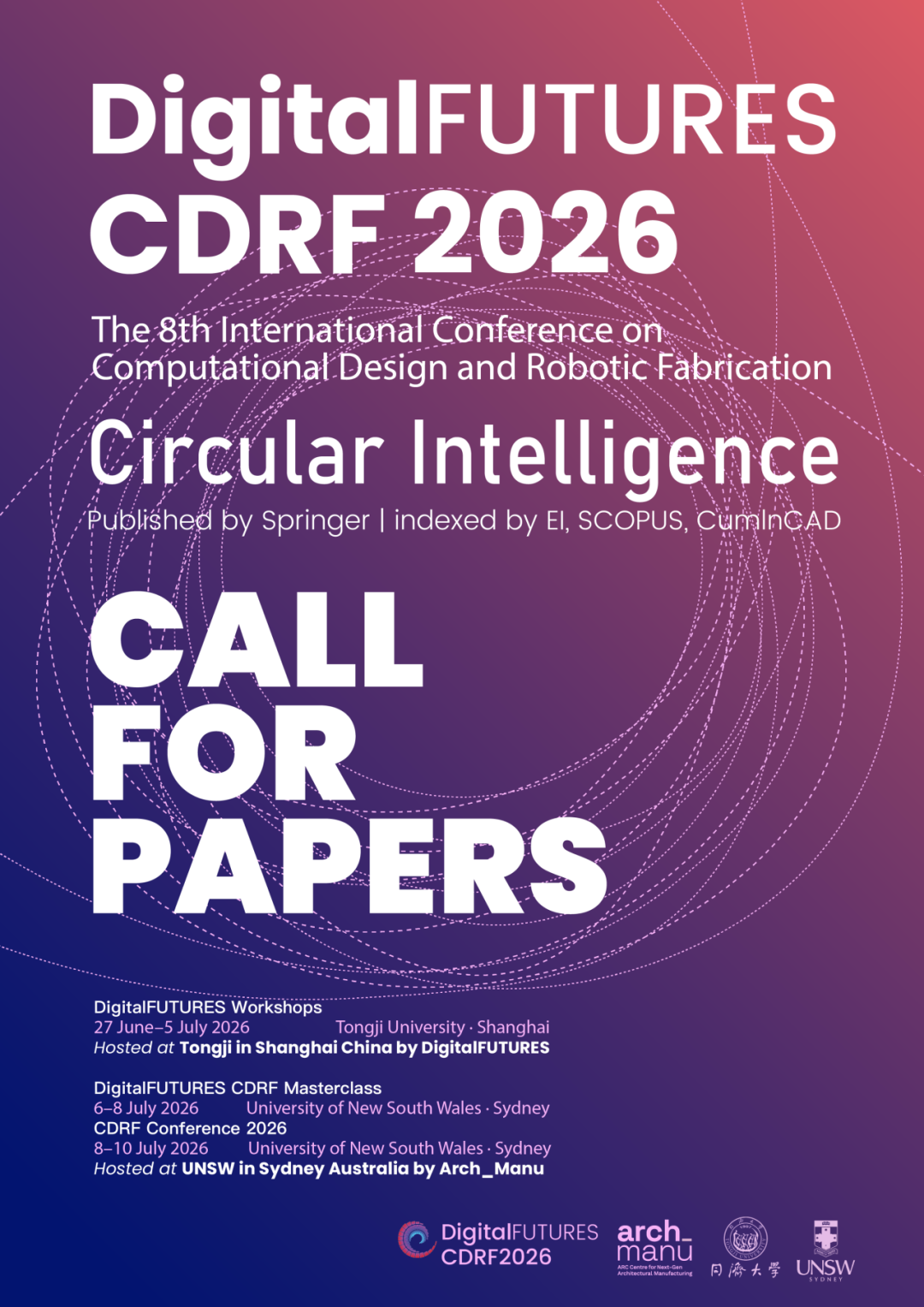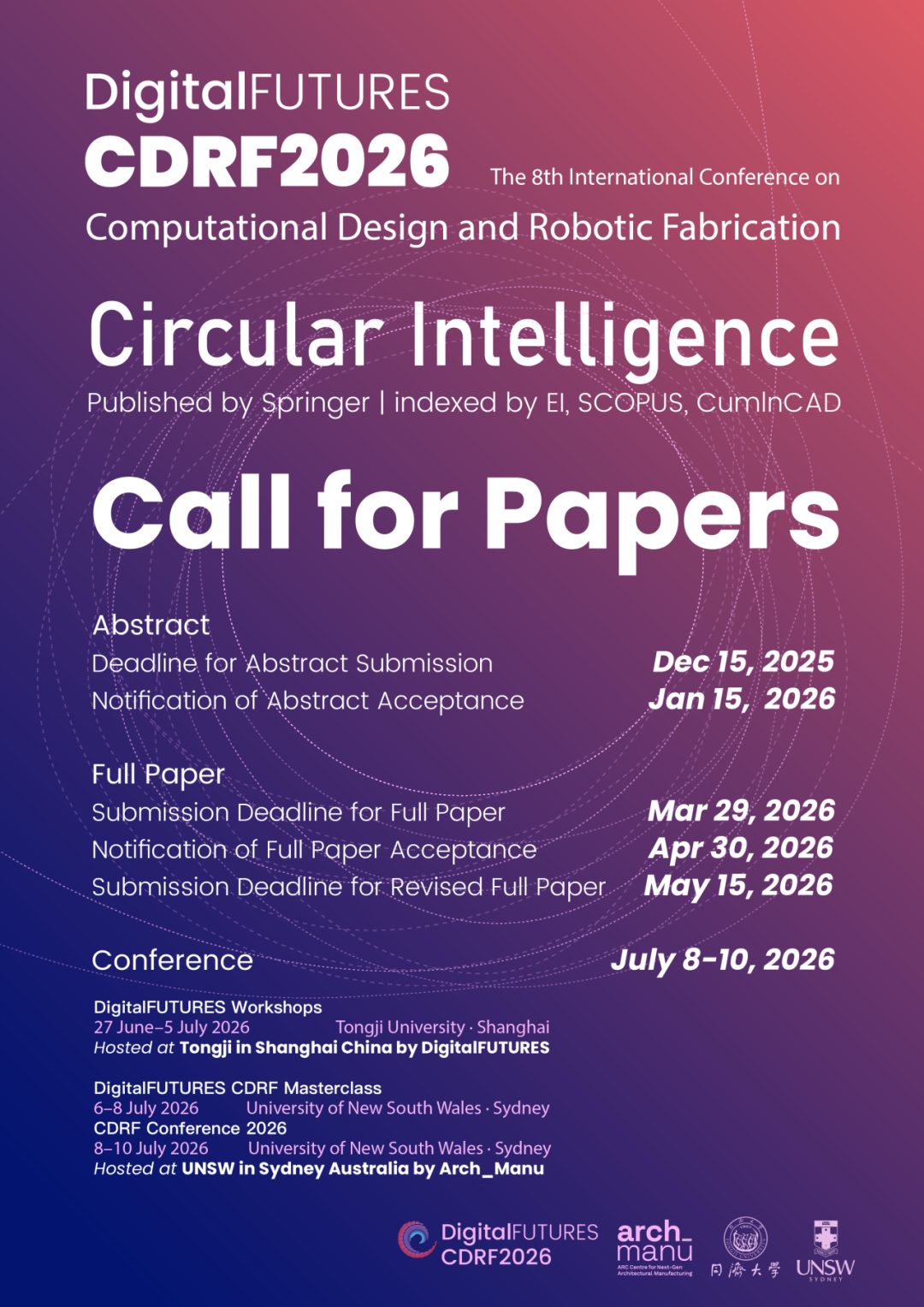
The DigitalFUTURES 8th International Conference on
Computational Design and Robotic Fabrication
(DigitalFUTURES CDRF 2026)
Call for DigitalFUTURES 2026
DigitalFUTURES Workshop Dates:
June 27~July 5, 2026
DigitalFUTURES Workshop Location:
Tongji University, Shanghai, China
DigitalFUTURES Official Website:
https://www.digitalfutures.world/
Call for CDRF 2026
Pre-conference:
DigitalFUTURES CDRF 2026 Masterclass
Pre-conference Dates:
July 6~8, 2026
Pre-conference Masterclass Location:
University of New South Wales (UNSW), Sydney, Australia
Conference Dates:
July 8~10, 2026
Conference Location:
University of New South Wales (UNSW), Sydney, Australia
The deadline for abstract submission:
December 15, 2025
Circular Intelligence

The contemporary construction industry is undergoing a dual transformation of digitalization and circularity, yet their deep integration remains in its nascent stage. As one of the major sources of global carbon emissions, the built environment faces multiple challenges: addressing climate change, enhancing production efficiency, and alleviating labor shortages; while also overcoming industry fragmentation, heavy reliance on global supply chains, and insufficient channels for research and innovation.
The 8th DigitalFUTURES International Conference on Computational Design and Robotic Fabrication (CDRF 2026), themed Circular Intelligence, advocates for the fusion of digital and circular design practices, reshaping the operational paradigms of the construction industry within an integrated ecological-computational framework. The conference welcomes research and practices exploring how computational design, digital technologies, robotics, and advanced manufacturing can drive the circular transformation of the built environment.
The DigitalFUTURES 2026 Workshops will continue to be held at the College of Architecture and Urban Planning (CAUP), Tongji University in Shanghai, China, focusing on teaching and skills training. Adopting a hybrid online-offline open mode, the workshops aim to facilitate course and practice exchanges for global students and educators.
At the same time, the Computational Design and Robotic Fabrication International Conference (CDRF 2026) will adopt an outbound strategy, hosting events at overseas universities and research institutions. Through deep collaboration with local academic communities, it seeks to expand international peer review and cross-disciplinary innovation networks.
We are delighted to announce that: the Australian Research Council (ARC) Centre of Excellence in Next-Generation Architectural Manufacturing Technologies and Training (Arch_Manu ITTC) will host the 8th DigitalFUTURES International Conference on Computational Design and Robotic Fabrication (CDRF 2026) and its accompanying Masterclasses in 2026 at the University of New South Wales (UNSW) in Sydney, Australia.
We cordially invite all participants to join us in Australia, to exchange cutting-edge ideas, conduct prototype validations, and collaboratively explore a regenerative construction future empowered by digital intelligence.
About DigitalFUTURES
DigitalFUTURES is launched by College of Architecture and Urban Planning (CAUP), Tongji University and Shanghai Digital Architecture Fabrication Technology Center (SFAB) in 2011. International Union of Architects (UIA), Architectural Society of China (ASC), National Engineering Technology Research Center for Prefabrication Construction in Civil Engineering, and The Architectural Society of Shanghai China (ASSC) collaborate with global renowned scholars, architects, designers, enterprises and academic media in this field to establish an online and offline integrated educational platform relying on Architectural DigitalFUTURES. The events are consisting of lectures, conferences, workshops and exhibitions, etc. Nowadays, DigitalFUTURES as a global architecture exchange community, with the platform www.digitalfutures.world, encourages the inheritance and innovation, collaboration and communication of global knowledge in architecture and emphasizes scientific research about digital design theory, technology and artificial intelligence algorithms, robotic fabrication, etc. in the field of architecture and built environment.
Research Topics
DigitalFUTURES CDRF 2026 provides a global platform for advanced research addressing Circular Intelligence in architecture. Topics covered by the papers include, but are not limited to, architecture theories, tools, methods and procedures in:
Circular Design: Data analytics towards decision-making in design; harvesting data from past projects; enabling design processes to leverage data and automation towards sustainability outcomes; opportunities for IoT / VR / AR / MR / AI / ML / digital twin concepts to support circular transformation; overcoming legal, ethical, and/or commercial challenges of using design data within a circular economy.
Circular Construction: Digitally-augmented processes to support design for advanced manufacture; design and construction in a future-proof and climate-positive way using computational technologies; data-led approaches to Modern Methods of Construction; additive and subtractive manufacturing using a range of incumbent as well as circular or bio-based materials; development and testing of robotic systems for on-site de-construction of buildings; human-machine interaction / robotic de-construction and de-assembly.
Circular Systems: Extrapolating future patterns and scenarios; effective strategies for enhancing circular collaboration; developing more efficient, reliable, and effective sector-wide circular workflows; reimagining Architecture, Engineering, Construction, and Operation business models for resilience and future-readiness; future of architectural education and training.
All papers identify which UN Sustainable Development Goals the research addresses.
Call for Papers
Deadline for Abstract Submission:
December 15 2025
Notification of Abstract Acceptance:
January 15 2026
Submission Deadline for Full Paper:
29 March 2026
Notification of Full Paper Acceptance:
30 April 2026
Submission DDL for Revised Full Paper:
15 May 2026
Conference:
8~10 July 2026
Submission Guidelines
Papers are peer reviewed in two stages:the abstract and the full paper. Submissions must be original and cannot be submitted simultaneously to another journal or conference. We strongly prohibit plagiarism (including self-plagiarism). During the review process and prior to publication, the originality of the paper will be checked several times. Upon submission, all submissions will be reviewed by the Committee for quality, originality, and relevance.
Abstract: Approximately 600 words, including the title, 3-5 keywords, 1-3 figures, and key references.
Full paper: A maximum of 10 pages fitting the CDRF paper template, including the title, abstract, keywords, figures/tables/charts, and references. The paper template will be released during the full paper submission stage.
Format: PDF.
Language: English.
Submission address: https://easychair.org/conferences/ (NEED TO UPDATE THIS)
Committee
Conference Chair:
Prof M. Hank Haeusler, UNSW
Co-Chairs:
Prof Mark Burry, Swinburne University of Technology
Prof Jane Burry, Adelaide University
Prof Blair Kuys, Swinburne University of Technology
Dr. Dingwen 'Nic' Bao, RMIT University
Dr Ivana Kuzmanovska, UNSW
Conference Secretary:
Dr Farnaz Fattahi, UNSW
Master Class Coordinator:
Dr Mehrnoush Latifi Khorasgani, Swinburne University of Technology
Editorial Committee:
Prof. Hank Haeusler, UNSW;
Dr. Dingwen 'Nic' Bao, RMIT University;
Dr Ivana Kuzmanovska, UNSW;
Dr Christopher Bamborough, UNSW;
Dr. Yige Liu, Tongji University;
Prof. Philip Yuan, Tongji University
Registration Information
CDRF Conference:
$300 AUD per person; $150 AUD student rate (valid student certification required)
Publication
In addition to being included in the EI, CumInCAD and SCOPUS index, accepted papers will be published by Springer in the Proceedings of the 8th International Conference on Computational Design and Robotic Fabrication (CDRF 2026).
Previous Conference Proceedings
CDRF 2023
https://link.springer.com/book/10.1007/978-981-99-8405-3
CDRF 2022
https://link.springer.com/book/10.1007/978-981-19-8637-6
CDRF 2021
https://link.springer.com/book/10.1007/978-981-16-5983-6
CDRF 2020
https://link.springer.com/book/10.1007/978-981-33-4400-6
CDRF 2019
https://link.springer.com/book/10.1007/978-981-13-8153-9
Architectural Intelligence Journal (ARI)
https://www.springer.com/journal/44223/
 ABOUT US
ABOUT US





